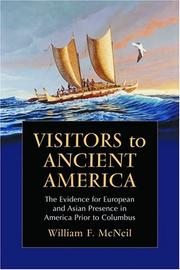| Listing 1 - 3 of 3 |
Sort by
|
Book
ISBN: 208080121X 9782080801210 Year: 2005 Volume: 702
Abstract | Keywords | Export | Availability | Bookmark
 Loading...
Loading...Choose an application
- Reference Manager
- EndNote
- RefWorks (Direct export to RefWorks)
Empire colonial français : on pense Afrique Noire, Indochine, Algérie. Et on en oublie la Nouvelle-France qui, à son apogée, au début du XVIII siècle, s'étendait sur près des deux tiers du continent nord-américain, de Québec à la Nouvelle-Orléans, des forêts glacées du Canada aux bayous de Louisiane, en passant par les prairies du Midwest. Un Empire dont la clé de voûte fut l'alliance avec les Indiens, qui permit aux Français de s'implanter et de se maintenir au nez et à la barbe des Anglais, plus nombreux, mais confinés sur le littoral atlantique. Colons, Indiens, esclaves africains composaient, surtout en Louisiane, une Amérique française au visage cosmopolite. Cette Amérique, que notre mémoire a occultée, n'a pas entièrement disparu. Les toponymes en témoignent : New Orleans, Baton Rouge, Saint-Louis, Montréal, etc., de nombreuses villes nord-américaines ont cri pour fondateurs des Français. Des millions d'Américains, aux États-Unis comme au Canada, ont des noms d'origine française. Archambault, Bissonnette, Boucher, Colombe, Dion, Pineaux, Roubideaux : imagine-t-on aujourd'hui que ces patronymes sont portés notamment par des Indiens du Dakota ? Parmi les descendants des colons français, et pas seulement au Québec comme on le croit parfois, certains parlent toujours la langue de Molière. Ce legs, on ne saurait le comprendre sans se glisser, au fil de la lecture, dans une pirogue ou dans un canoë à la recherche d'une histoire ignorée.
French --- History. --- America --- History --- To 1810 --- Ethnic relations --- North America --- Colonial period, ca. 1600-1775 --- France --- Colonies --- French (Nation) --- French - America - History.

ISBN: 0786419172 Year: 2005 Publisher: Jefferson ; London McFarland
Abstract | Keywords | Export | Availability | Bookmark
 Loading...
Loading...Choose an application
- Reference Manager
- EndNote
- RefWorks (Direct export to RefWorks)
Asians --- Europeans --- Explorers --- Discoverers --- Navigators --- Voyagers --- Adventure and adventurers --- Heroes --- Discoveries in geography --- Ethnology --- Orientals --- History --- America --- Antiquities. --- Discovery and exploration --- Pre-Columbian. --- Pre-Columbian --- To 1810 --- Antiquities --- To 1500

Abstract | Keywords | Export | Availability | Bookmark
 Loading...
Loading...Choose an application
- Reference Manager
- EndNote
- RefWorks (Direct export to RefWorks)
Two centuries after Corte;s and Pizarro seized the Aztec and Inca empires, Spain's conquest of America remained unfinished. Indians retained control over most of the lands in Spain's American empire. Mounted on horseback, savvy about European ways, and often possessing firearms, independent Indians continued to find new ways to resist subjugation by Spanish soldiers and conversion by Spanish missionaries. In this panoramic study, David J. Weber explains how late eighteenthcentury Spanish administrators tried to fashion a more enlightened policy toward the people they called 'barbaros, 'or & savages.& Even Spain's most powerful monarchs failed, however, to enforce a consistent, well-reasoned policy toward Indians. At one extreme, powerful independent Indians forced Spaniards to seek peace, acknowledge autonomous tribal governments, and recognize the existence of tribal lands, fulfilling the Crown's oft-stated wish to use & gentle& means in dealing with Indians. At the other extreme the Crown abandoned its principles, authorizing bloody wars on Indians when Spanish officers believed they could defeat them. Power, says Weber, more than the power of ideas, determined how Spaniards treated & savages& in the Age of Enlightenment.
Indians --- Colonization. --- Government relations. --- Missions. --- Spain --- New Spain --- America --- Colonies --- Administration. --- Discovery and exploration. --- History --- Indians, Treatment of --- Aborigines, American --- American aborigines --- American Indians --- Amerindians --- Amerinds --- Pre-Columbian Indians --- Precolumbian Indians --- Ethnology --- Colonization --- Government relations --- Missions --- Civilization --- Espanja --- Spanien --- Hiszpania --- Spanish State --- España --- Estado Español --- Espagne --- Hispania --- Sefarad --- Sepharad --- Shpanye --- Shpanie --- Reino de España --- Kingdom of Spain --- Reino d'Espanya --- Reinu d'España --- Espainiako Erresuma --- Regne d'Espanya --- Reiaume d'Espanha --- Espanya --- Espanha --- スペイン --- Supein --- イスパニア --- Isupania --- Administration --- Discovery and exploration --- To 1810 --- Indigenous peoples
| Listing 1 - 3 of 3 |
Sort by
|

 Search
Search Feedback
Feedback About
About Help
Help News
News